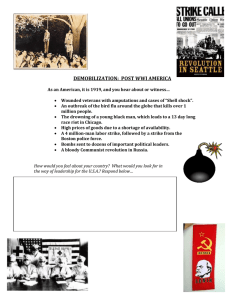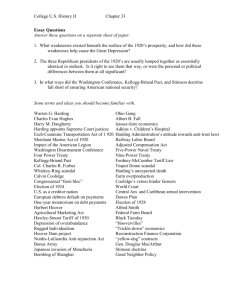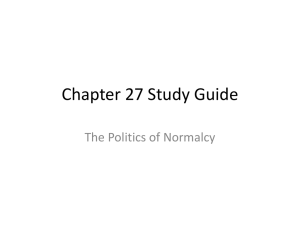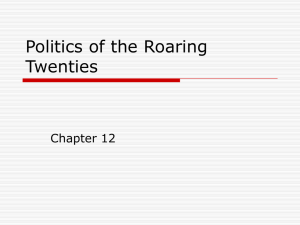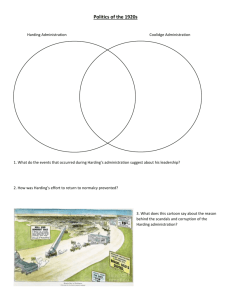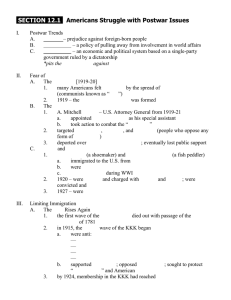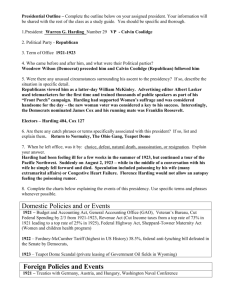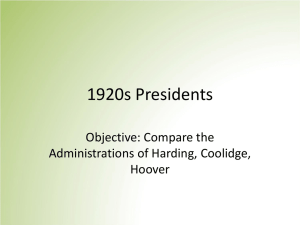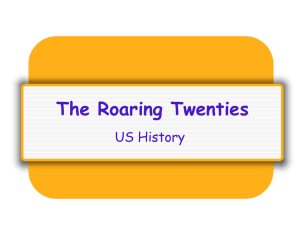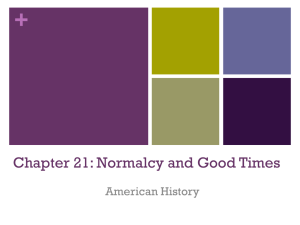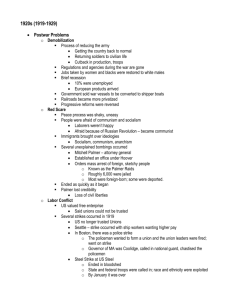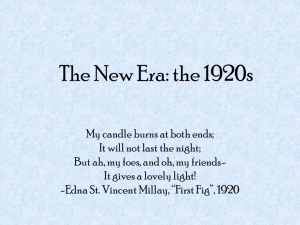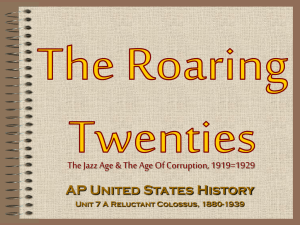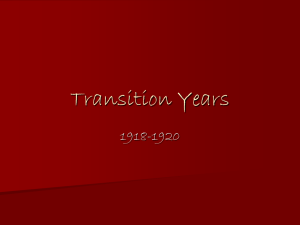Chp12notes - MrMillerHonorsUShistory1
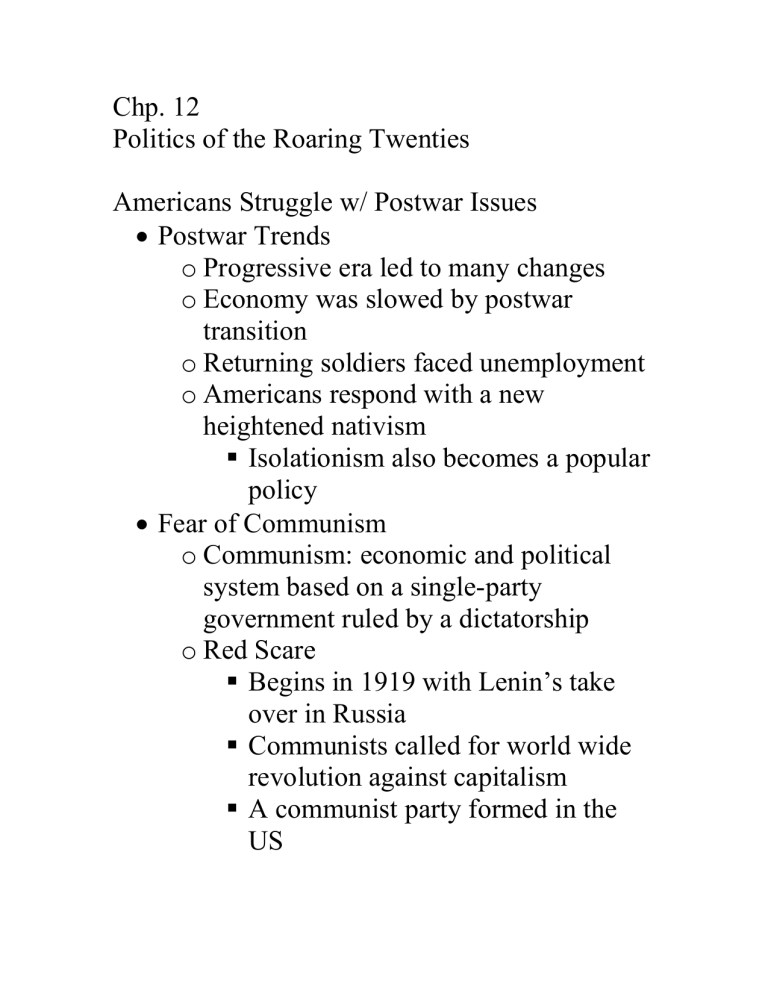
Chp. 12
Politics of the Roaring Twenties
Americans Struggle w/ Postwar Issues
Postwar Trends o Progressive era led to many changes o Economy was slowed by postwar transition o Returning soldiers faced unemployment o Americans respond with a new heightened nativism
Isolationism also becomes a popular policy
Fear of Communism o Communism: economic and political system based on a single-party government ruled by a dictatorship o Red Scare
Begins in 1919 with Lenin’s take over in Russia
Communists called for world wide revolution against capitalism
A communist party formed in the
US
Mailed bombs to government and business leaders
US Attorney General Mitchell
Palmer took action to prevent the Red Scare
Palmer Raids o August 1919, Palmer appointed J. Edgar
Hoover as a special assistant
Hunted down suspected
Communists, socialists, and anarchists
Trampled people’s civil rights
Invaded homes, businesses, jailing suspects w/out legal counsel
Foreigners were deported
Sacco and Vanzetti o Italian immigrants that evaded the draft during WWI o May, 1920 they were arrested and charged with robbery and murder
Had alibis, evidence was weak, judge was prejudiced
Despite national protests the men were executed via electric chair on
August 23, 1927
1961: ballistic tests proved that
Sacco’s pistol was the gun used to kill the guard. But, can’t prove he did it.
Klan Rises Again o Red Scare and anti-immigrant feelings gave a new rise to KKK o 100% Americanism
Anti: Black, Saloons, Unions,
Catholics, Jews, Foreign born
Quota System
Emergency Quota Act of 1921 established a quota
Maximum number of people from each country that could enter the US
1927 law restricted total number of immigrants in any year to 150,000
Japanese immigration prohibited; causing tension b/w Japan and US
Japan angered b/c this violated the gentlemen’s agreement signed in 1907 by TR
A Time of Labor Unrest o By 1919 3,000 strikes with some 4 million workers walked off the job o Strikers looked at as communists
Boston Police Strike o No raise since beginning of war o Police decided to strike
Governor Calvin Coolidge called in
National Guard
“There is no right to strike against the public safety by anybody, anywhere, anytime.”
New police were hired
Coolidge would become Harding’s running mate in 1920 election
Steel Mill Strike o Workers wanted to negotiate for shorter hours and a living wage o In 1919 US Steel Corporation refused to meet with union reps
300,000 workers walked off their jobs
Steel companies hired strikebreakers and used force
Strikers were beaten by police, fed troops, and state militias
President Wilson pleaded w/ negotiators to find an agreement
Strike ended in 1920
Coal Miners’ Strike o 1919, United Mine Workers of America was led by John L. Lewis
Attorney General Palmer obtained court order
Strikers told to return to work
(Lewis secretly said they should continue)
Miners received a 27 percent wage increase
Labor Movement Loses Appeal o Membership drops for several reasons:
Immigrants willingness to work in poor conditions
Language variances make it difficult to unite
Farmers who now have city jobs used to self-reliance
Most unions excluded African
Americans
Harding Presidency
Harding struggles for peace o Arms control, war debts, and the reconstruction of war torn countries o Washington Naval Conference
Sec of State Charles Evans Hughes urged a limit on warship construction for a ten year period
GB, Japan, France, Italy, and the US encouraged to scrap their warships
First disarmament agreement in history o 1928, 15 countries signed the Kellogg-
Briand Pact
Renounced war as a national policy
High Tariffs and Reparations o Britain and France owed US 10 billion
Sell products to US or collect reparations from Germany o Fordney-McCumber Tariff
Raised taxes on some imports to
60% o Germany experiencing terrible inflation
France marched on Germany when they were unable to pay
Charles Dawes sent to negotiate loans
Dawes Plan: o American investors loaned
Germany 2.5 billion o Germany paid debt and countries then paid US back o France and England considered the US a miser for not paying a fair share of the costs of WWI o US benefited from defeat of
Germany while thousands of Europeans lay dead
Scandal hits Harding’s Administration o Harding’s Cabinet
Ohio Gang
Charles Evans Hughes appointed
Sec of State
Herbert Hoover appointed Sec of
Commerce
Andrew Mellon Sec of Treasury
Cut taxes and reduced national debt
Cabinet also included the Ohio
Gang: friends of Harding o Scandal plagues Harding
Friends used offices to become wealthy through graft
Charles Forbes, head of Veteran’s
Bureau, caught illegally selling government and hospital supplies to private companies
Thomas Miller, head of Office of
Alien Property, caught taking bribes
Teapot Dome Scandal o Oil rich lands in Teapot Dome,
Wyoming and Elk Hills, California for use by US Navy o Sec of Interior Albert B. Fall managed to transfer reserves to Interior Dept.
Fall leased lands to two private oil companies
Received 400,000 in loans, bonds, and cash
Found guilty of bribery and became the first American to be convicted of a felony while holding a cabinet post o “I have no trouble with my enemies…but my…friends, they’re the ones that keep me walking the floor nights!” o Harding died suddenly on August 2,
1923 o Calvin Coolidge assumed the presidency
The Business of America o American Industries Flourish
Coolidge and Hoover supported limited government interference in business
Placed high tariffs on imports, wages rising, technology improved, and productivity increased o Impact of the automobile
Landscape changed; paved roads
Houses added carports and garages, driveways, smaller lawns
Gas stations, repair shops, motels, tourist camps, shopping centers
First automatic traffic signals began in Detroit in the early 1920s
Holland Tunnel: 1 st underwater tunnel for motor vehicles opened in
1927, connects NY City and Jersey
City, NJ
Woodbridge Cloverleaf, 1 st cloverleaf intersection built in NJ in
1929
Vacations
Urban Sprawl
Economic base for cities such as
Akron, Ohio, Detroit, Dearborn,
Flint, and Pontiac Michigan
Oil production increased
1920s, 80% of all vehicles in the world were in the US
New Car cost $275
Will Rogers to Henry Ford, “It will take a hundred years to tell whether you helped us or hurt us, but you certainly didn’t leave us where you found us.”
Standard of Living Soars o 1920-1929 prosperous years o 40% of world’s wealth in the US o Incomes rose nearly 35% from $522 to
$705
Electrical Conveniences o Electricity begins to reach suburbs o Electric irons, refrigerators, cooking ranges, and toasters now possible o Made ladies work easier and provided free time for leisure or work outside of home
Modern Advertising o Increase of products and brands required marketing strategy o Psychologists hired to study how to appeal to people’s desires for youthfulness, beauty, health, wealth
“Say it with flowers”
“Reach for a Lucky instead of a sweet” o Luxury items began to become necessities
1923: Listerine convinced people that without mouthwash you stood the chance of having halitosis
Superficial Prosperity o Producing Great Quantities of Goods
Production increases resulted in business increases
Stores and factories increased in number
As numbers grew so did disparity in wealth b/w workers and managers
Iron and RR industries were not prosperous and farmers were suffering large losses due to overproduction
Buying on Credit or On Margin o Installment plans o Banks provided money at low interest rates o Some worried that installment buying was getting out of control
People were unable to meet
payments when due
